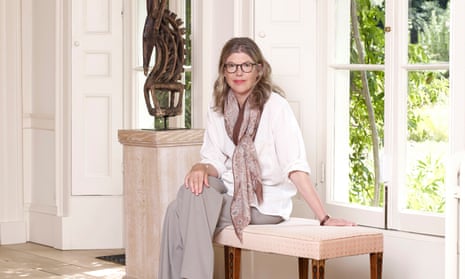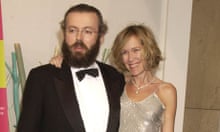On 8 July, 2012, the philanthropist and writer Sigrid Rausing flew with her family to their summer house by the sea in Sweden. While they were travelling, everyone was happy: even their dog, Leo, seemed to be smiling as they pointed out the old familiar landmarks to one another from the plane. Once they were on the ground, however, something changed – for Sigrid, if not the others. The sky was blue. The policeman who checked their passports on the tarmac was kind. But the atmosphere was suddenly eerie. “I feel like something is going to happen,” she said to her husband, Eric.
The next day, she had a telephone call scheduled, the subject for discussion being the issue of human rights in Belarus. It began, as planned, at 2.30pm. Soon afterwards, Eric slipped silently into her office. He had written a note, which he now passed to her, and which she read as the voice on the other end of the line continued to talk of Andréi Sannikov, the activist who had recently been released from prison by President Lukashenko. Five words: half expected, and yet so utterly unimaginable. “They have found Eva’s body,” it said. What does she remember of this moment? That the room stilled. That she couldn’t breathe, or move. That the shock had an underwater quality, heavy and silent.
Everyone knows – or they think they know – the rest. The headlines were feverish, gothic to an almost exuberant degree. As she would shortly find out, that morning her brother Hans had been stopped by the police on Wandsworth Bridge Road in south-west London, their attention having been drawn by his driving. Following the discovery of a crack pipe and drugs in his car, as well as a collection of letters addressed to his wife, Eva, his vast house in Cadogan Place, Chelsea, was searched, and it was there that the horrible discovery was made. On a bed in a first-floor room that a policeman would describe as looking like a squat, a body was found, covered first by a pile of blankets, duvets and clothing – these were coated with white powder, possibly a kind of deodorant – and then by a blue tarpaulin, several television screens and some drawers. Eva Rausing had lain there since 7 May, when her heart, weakened by years of drug dependence, had finally given up. Later, Hans would say in a statement that he had hidden her like this because he could not face the fact that she was dead. On 1 August, he was convicted of preventing the lawful burial of her body, and given a 10-month prison sentence, suspended for two years.
In her powerful and spare new memoir – it is called Mayhem, which, as well as meaning chaos, is an old English legal term for the crime of maiming – Hans Rausing’s sister takes a long time to reach this horror show. Circling around it, she is more than 100 pages in before she finally arrives at the fact of a body. Naturally, this has to do with dread. Five years on, and though the details are well known to her now, she would still rather look away. But other forces are at play, too: her refusal, perhaps, to give in to ghouls; her natural tendency to approach any subject in an academic manner, pausing for thought as she goes (she trained as an anthropologist). To be writing such a book at all felt, she says, “very transgressive” in a family, both famous and famously secretive, that has its own code of omerta, so no wonder if she drags her feet. Still, whatever her reasons, her elisions and prevarications have a striking effect. As the weight of her pages makes clear, what seemed sudden to the world – flashbulbs do not take account of a backstory – was, for her, years in the making. And thanks to this, you find yourself, once in her presence, thinking less about Hans and the awful thing that he did than about the fact that Sigrid somehow managed, in spite of everything, to keep going, and even, perhaps, to thrive.
When I tell her this, she laughs. “I don’t know about that,” she says, in an accent that is still Scandinavian at its edges (her family came here from Sweden in the 1980s). Pressure, she believes, expresses itself in various ways, not all of which involve having a nervous breakdown. “Remember, in my book I write about my horse and a concussion I suffered when I fell [in 2009]. That gallop was dangerous, and I knew it was. But now that I think about it, I couldn’t have asked for a more perfect condition. It was a very severe concussion, and concussion is about the obliteration of memory. Under pressure, you couldn’t ask for something better, and curiously, it was a relief to have it.” As she also reminds me, Mayhem is full of portents, most memorably an adder that crosses her path not once, but twice. “Suppressed pressure turns into superstition, too. I noticed it in myself, the way I got more superstitious.” Foreboding, in the dark years, was a constant: a queasy cloak she could never quite take off, even as she got on with her life.
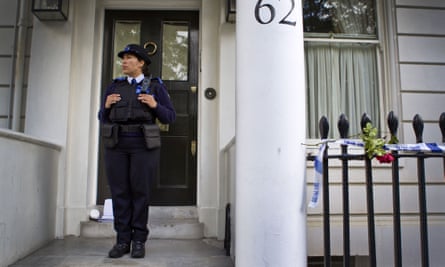
Our meeting takes place at the Holland Park offices of Granta, the literary magazine that she owns and now edits (she lives nearby in a huge house that is supposed to have London’s second-biggest private garden after Buckingham Palace). It is high summer, and everyone seems to be away; the building is cool and quiet and our voices, even lowered, sound unnervingly loud to my ears. She is wearing what I take to be her uniform – white shirt, trousers, mannish brogues – and her face, as she’s about to remind me, is entirely without makeup. “It’s always the same,” she says. “In every interview I do, there’s always a line that goes: Sigrid Rausing, the Tetra Pak heiress who wears no makeup.” This isn’t a warning: though she isn’t one to talk for the sake of it (it’s impossible not to notice that she isn’t afraid of silence), her manner is confiding, almost eager. Later, when we talk about money, I’m not surprised when she tells me that, in spite of her huge wealth, she finds it perfectly easy (too easy, perhaps) to trust people.
Even before its publication, her book is causing trouble. In the days after we talk, Eva Rausing’s father, Tom Kemeny, will question its “agenda and objectives” and damn it for being “self-indulgent and pretentious” and upsetting to the family. Sigrid, though, has no regrets, at least not in the fact of the book’s existence. Yes, there were things that, for legal reasons connected to Hans and Eva’s four children, she could not say; if she’d been completely free, “it would not perhaps have been quite so sweet… there is a sweetness to it that now… disturbs me”. But this cannot detract from the relief that writing it has brought her. “It’s interesting,” she says. “I never believed in catharsis. I thought of it as a cliche. But the truth is that it was immensely cathartic. I often wept as I wrote, and I did come through to another place. When you write a book, you end up with a tremendous grip on the story. You’ve taken parts out, so it’s a false grip; the real story was much worse and far more complicated. But in the process of writing it… I suppose it’s like knitting. You create a pattern, you stitch it altogether, and that becomes the story, and you feel like you’re on top of it. That discipline is very comforting.”
Did she feel compelled to write it? “I think I started because I was so shocked,” she says. “There was so much grief. I’m somebody who has always written in response to what is going on in my life. After that, I got this very intense urge to find out exactly what happened; it became almost like a detective story. I needed to do it, but very little of it ended up in the book. Then I started to think about the broader questions to do with addiction. I came to the conclusion that it is more mysterious than we think: a no man’s land, halfway between mental illness and bad behaviour.” What, she asks in Mayhem, is the relationship between her family’s wealth and privilege and Hans’s addiction? Is his illness in the Rausing genes – her great-grandfather was an alcoholic – or has it as much to do with nurture as with nature? Outwardly, the three Rausing children, with their green eyes and brown hair, were peas in a pod. But while she and her older sister, Lisbet, became academics at first, like their mother, Marit, Hans, who is 16 months her junior, went a different way: at the age of 18 or 19, he met heroin on a Goan beach. In a meritocratic country like Sweden, was it impossible for him to model himself on his father, Hans Sr, the billionaire? Or was he simply more susceptible to temptation than his sisters?
What does her family make of the book? She is interested in how different their responses have been. “My editor at Knopf [the American publisher of Mayhem] kept interrogating my use of the word “us”. “Who is this ‘us’?” he would ask. But in fact it turns out that he was right and the “we” is a collection of individuals. Everyone has their own view. Some do [like it], and some don’t, and I have to live with that.” What about Hans? Has he read it? She shakes her head. “He has said that he prefers not to, and I can see why.” In 2014, Hans, who is in recovery, married Julia Delves Broughton, a director of Christie’s and the younger sister of Isabella Blow, the late fashion stylist. They celebrated with a ritzy party. How would she describe him now? “I think he is happy and well,” she says, carefully.
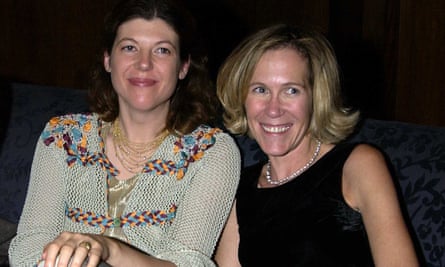
While this is the case, her long-held vigilance remains in abeyance, something that comes as a relief: “I can feel it subsiding,” she tells me, her shoulders visibly falling. However, it is unlikely ever to disappear altogether, and not only because recovery is, as she puts it, a “fragile” state. In her book, she notes that she continues to be haunted by the sight of such things as sweet wrappers and plastic bottles, however innocent their purpose – and it’s a line that she stands by. “Oh yes, I meant it when I wrote that it seemed to me that the line between teenage mess and a drug den was very fine,” she says. “It is very fine – much more so than we’re willing to admit.”
Hans and Eva Rausing met in the late 1980s, when she was asked by the rehab facility she had recently left to come back and talk to him, to persuade him to stay on (he was about to walk out). They became friends, and some time later – by now a couple – Hans took her to visit his family in the country. Sigrid remembers that first encounter well: there she was, a thin, blond, American-seeming woman (her mother was from North Carolina) in a pink Chanel suit, who looked simultaneously “young and old, conventional and wild, groomed and unkempt”. Their wedding took place in 1992. By 1999, they had three children. Then, eight years after they were married, they had a “catastrophic” relapse. This lasted for 12 years. Sigrid was 38 when it began, and 50 when it ended.
She did what she could to help, but she also knew – experience had taught her – that the families of addicts are as powerless over drugs as addicts themselves. “You can be too understanding,” she says. “It would have been better if everybody had taken Eric’s view [her husband, a film producer, doesn’t really regard addiction as an illness and saw Hans’s and Eva’s drug taking as irresponsible and selfish]. Part of codependency is that you start to think that you can help.” In her book, she reproduces parts of a letter she wrote to Eva in 2004, in which she reassures her that she is on her side. Reading it, it struck me as not only generous and kind, but amazingly frank, too. “The problem is that the descent into rock bottom is so long if you live the kind of life we do,” she writes. “Propped up by nannies and staff, one could go on in a twilight existence of alcohol and pills for years.” But it was no good. The descent would indeed be long. “[Without their wealth] they would both have died, or gone to prison,” she says. As it was, locked in their room with only their drugs for company, the names of their dealers scrawled on its walls, Hans and Eva were like a couple of castaways, “scavengers in their own house”.
In the summer of 2006, Eva almost died from endocarditis, a heart infection, probably caused by dirty needles. The family staged an intervention. Eva stormed out, enraged. Hans listened, checked into rehab, but stayed only a few days. After this, social workers became involved. The couple’s children were deemed to be at risk. In 2007, the social workers told Sigrid and Lisbet that unless they took measures to remove them, they would do this themselves. And so, the sisters went to the family court. The section in Mayhem that covers this period is perhaps its most painful to read. Hans and Eva would arrive for the hearings hours late. He would be “slumped forward, eyes half closed”. She would fidget constantly, and then abruptly leave. On her return, she would be swaying and dreamy. Eventually, the children were placed in Sigrid’s care (she also has a son of her own). The youngest was six years old. “Hans and Eva loved their children,” she writes. “I know that. But isn’t that also a cliche of parenting? What’s the point of love if drugs come first?” By her telling, which is never boastful, she was a devoted, conscientious aunt. Still, guilt gnawed away at her: “People praised us for looking after them. But removing children from their parents is always an exercise of power.”
After this, contact was patchy. She never saw Eva again, and she did not see Hans from 2008 until 2014. Eva, though, was inclined to text and email. Sometimes, these notes were furious: “I despise you with an intensity that is not describable.” Sometimes, they were sad: “I sense that I am going to die soon.” She told social workers that Eric was gay and that Sigrid was depressed and on drugs, and that they were not suitable parents (somewhat comically, the social workers, even as they investigated, felt compelled to communicate their disapproval of Eva’s implicit homophobia). She made a wax doll of Sigrid, for the purposes of witchcraft. She also pursued a vendetta against Sigrid’s father, Hans, who she insisted was behind the murder of Olof Palme, the Swedish prime minister who was assassinated in 1986. She even wrote to a journalist about this (the Swedish tabloids made much of it after her death).
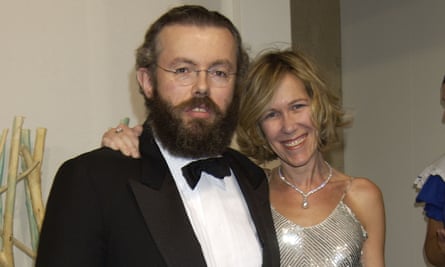
In January 2012, she told a friend she was going to go into rehab – and she did, in April, a week before she died. But she was thrown out, for having brought Valium with her. “I couldn’t have predicted what happened, partly because I really did think it was possible that Eva was on her way to recovery,” Sigrid says now. “I felt so angry with myself afterwards, because I thought it would [if anyone was to die] be Hans. But of course it was going to be her. He was a big, strong man and she was a petite woman with a weak heart.” Was it secrecy – by now, they were virtual recluses – that made her blind? “Yes. But it’s also about love. Its price [is] fear of loss of the beloved. In some sense, this book is a love letter to my brother.”
She and Hans were close as children – all three siblings were united in their loathing of school – and their childhood was, in the holidays at least, idyllic. She describes the weeks they spent at their Swedish summer house as charmed, as if out of a fairytale. And yet, her parents seem to have been, for all their immense wealth, quite normal. It is not as though the place was running over with chauffeurs and butlers: her father cooked and shopped and took out rubbish: “I think that was to do with Sweden, and social democracy. My mother was a radical social democrat when she met my father.”
When did she first know her family was different to other people’s? “It was always there,” she says. And quiet Hans struggled with it. “Who do you become if you are the son of a very, very successful entrepreneur? I don’t know if you saw Hilton Als’s piece about [the photographer] Diane Arbus in the New York Review of Books? She came from a very wealthy background, and she once wrote a letter to a friend in which she described walking through the family fur emporium and sensing everybody’s reaction when they saw her, the heiress: she felt a bit like a princess, but there was also something slightly malicious about that gaze. I think that was true for us, too. The question of inheritance is one that society hasn’t solved.”
In the late 1980s, while Sigrid was studying for her PhD in London, Hans came to stay at her flat in Islington. This wasn’t a success. By the time she asked him to go, he had stopped washing. Again, he went into rehab, but as he slowly recovered, Sigrid fell into a depression that felt like a “cold claw” at the throat. One evening, she took a knife and cut long stripes on her arm. Sensing danger, she went into rehab herself. “I don’t like the word codependence,” she says. “The relationship between my depression and his addiction is quite complicated. But I think they weren’t dissimilar. Somebody said there is a bit of survivor’s guilt in the book, and that’s possible. Science has shown that alcohol addiction at least is inheritable. People think this might be true of all addictions, and I broadly agree with that. So, you come into the world with a vulnerability. If you’re going to be all right, you need certain conditions. Work is one. Love is another.”
Work has always been her balm. “In the end, the thing that really helped me was going to live on a collective farm in Estonia [she wrote about this experience, fieldwork for her PhD, in her book Everything Is Wonderful]. Before I left, I was still having panic attacks. But within two weeks they were gone. It was very peaceful, and my project had meaning and purpose. I was intellectually engaged in it.” The pleasure she takes in editing Granta is obvious. “I love it,” she says, handing me the latest edition. “I love talking to writers about their ideas, I love putting it all together, I love my team.” She is adamant that her sense of identity is not tied up with her money – and I almost believe her (surely a tiny part of it is: after all, she is only, to be blunt, the editor of Granta because she could afford to buy it). “I’m not interested in money,” she says. “I genuinely think that.”
Either way, she has come to terms with her wealth, in the sense that she knows how she wants to use it. A famously generous philanthropist, she gives away, via her trust, millions of pounds every year. Was it always obvious to her how she should spend it? “I wouldn’t want to pretend it was simple,” she says. “It was a process – and every time I think I’ve come to terms with it, [I realise that] I haven’t. I feel grateful and overprivileged and there is a gendered component in that. It’s a masculinising force. It allows you great freedom, but it also allows you to be greatly objectified by others.” And for all the good work that she does, she doesn’t necessarily regard her philanthropy as admirable: “The truth is that whatever you do with money attracts attention – if I wanted no attention, the best thing would be to do nothing at all.”
Mayhem, which is dedicated to Hans and Eva’s four children, doesn’t have a conventionally happy ending: for all that she describes her sense of reprieve as she watches the newly clean Hans sitting in a folding chair, eating an olive as the swifts fly overhead, there is no moving towards the light, no neat tying of ends. How could there be? The legacy of what happened to her family is, and always will be, ongoing. And there are so many others in the same boat: while she was writing, drugs became the leading cause of accidental death in the US. But still, she has sent it out into the world where, in spite of her extreme judiciousness in the matter of words, the headline writers will doubtless make merry with it. How does that feel? “There is something brave about publishing it,” she says, quietly. “But maybe it’s also foolhardy.” At this thought, for all her seriousness, she sounds almost giddy.
